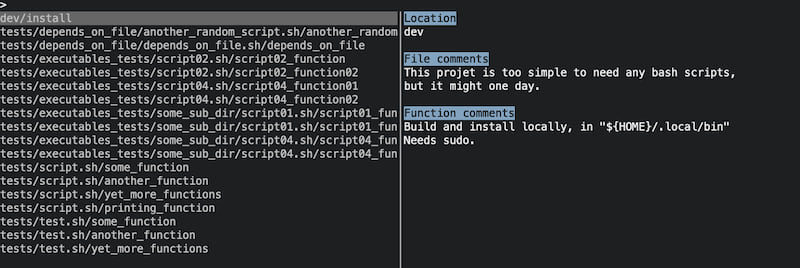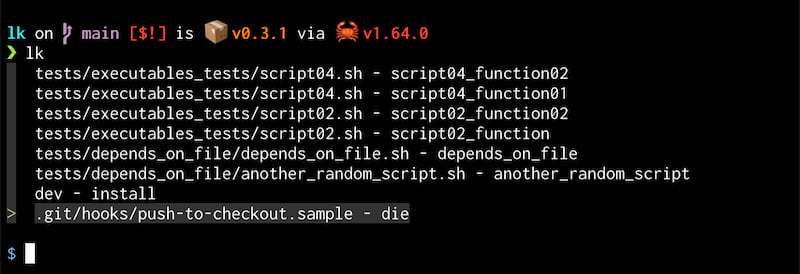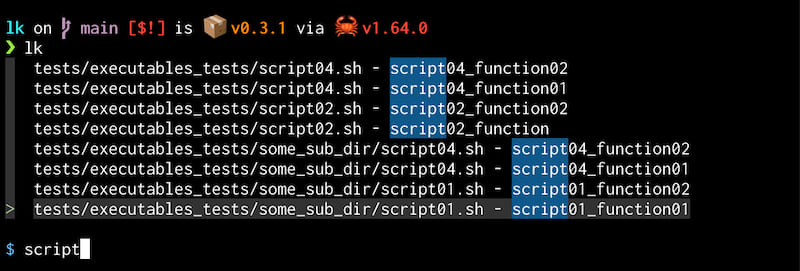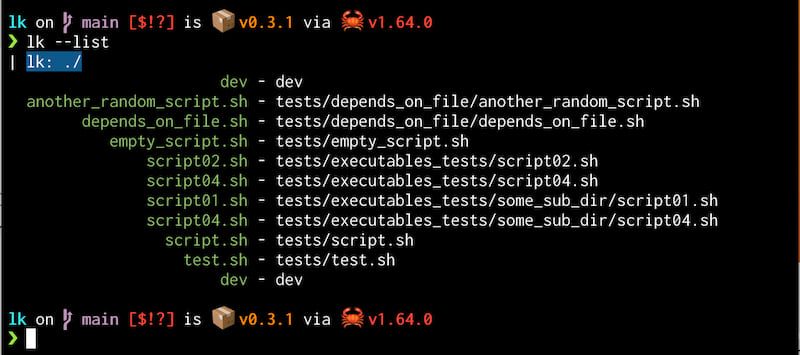18 releases
| 0.5.1 | Apr 15, 2024 |
|---|---|
| 0.4.1 | Sep 1, 2023 |
| 0.3.4 | Jan 12, 2023 |
| 0.3.2 | Nov 5, 2022 |
| 0.1.5 | Oct 14, 2021 |
#199 in Command-line interface
982 downloads per month
2MB
1K
SLoC
lk
Overview
A command palette for your bash functions. Run in a dir with lots of bash files, fuzzy find a function, and run it. It looks like this:

Modes
You can explore your bash functions in three different ways:
-
The Terminal User Interface (TUI), which takes up the whole terminal window
-
An
fzfstyle inline search -
By printing out lists of functions.
TUI
The default mode (--tui or -t).
Here's lk run on it's own repo.

It has fuzzy find::

You hit enter to run the functioun.
Inline fuzzy find
The old default (--fuzzy or -f):

This also has fuzzy find, obviously:

Lists
You can also explore bash files via the List mode (--list), like this:

You can drill into those files to see what functions they have. Notice that you don't need --list now:

You can execute the functions them by passing the function name:

This means you can write scripts that use lk, if you want to.
Changing the default mode
You can change the default mode by editing lk's config file, which lives at ~/.config/lk/lk.toml:

The log file lives in that directory, if you're interested or maybe want to contribute to lk's development. You can see all of lk's options by running lk --help, obviously.
Why use lk?
- You're a polyglot engineer with package manager fatigue. So you want to hide it all behind some bash, the lingua franca.
- You do a lot of devops and have a lot of bash.
- You have a lot of projects that you don't work on for months at a time, and you need to bring some consistency to the experience of re-visiting them.
- You use
makeandPHONYto do non-compile stuff to your project.lkjust lets your write proper bash without all themakespecific guff. - You ever copy and paste bash from a text file you keep somewhere.
Installing
Homebrew
brew tap jamescoleuk/taps
brew install lk
Cargo
cargo install lk
How to write bash files so they work with lk
lk executes bash functions. This sort of thing:
# A glorious function that does all the things
be_glorious() {
echo "Ta da!"
}
It executes these functions by sourcing the file, and then running the function. The equivelant of this:
. my_file.sh
be_glorious
This means anything outside a function will be executed. This is handy if you want to source other files, or set environment variables, because they'll be available to your functions. For example:
#!/usr/bin/env bash
#
# Some comments.
. "~/scripts/lib.sh"
readonly DATABASE_USER="johnsmith"
# A glorious function that does all the things
be_glorious() {
echo "Database user is ${DATABASE_USER}"
}
But this does mean most of the functional stuff in your script needs to be in functions. I appreciate this may not be how everyone wants to work, but it's fine for many use cases. The last thing I want to do is tell people how to write their scripts.
Incidentally, the comments in the scripts above will appear in --list mode, like this:

So --list mode allows you explore and discover your scripts, and --fuzzy mode lets you get to functions you are perhaps already more familiar with.
If you use --fuzzy then lk will write the command you executed to your bash history, so you can use ctrl-r to re-execute it. Obviously if you used --list it will already be there.
Ignoring files
lk supports glob-based excludes and includes, using toml. For example:
excludes = [
"**/exclude_me",
"target",
".git",
]
You can make this global by putting it in ~/.config/lk/lk.toml, or local by creating a lk.toml file in, say, a project directory. If the lk.toml file is in the same directory from which you execute lk then it'll find and use it. You can also add includes and excludes as a switch. See lk --help for details.
Ignoring functions
If you prepend a function with an underscore it will be ignored by lk:
_my_ignored_function() {
echo "not happening"
}
Installation
From the crate:
cargo install lk
Update
cargo install --force lk
Use case examples
- AWS:
- You need to pull down config from AWS and store it in
.envfiles. - You need to switch between AWs environments
- You need to pull down config from AWS and store it in
- You need to build and deploy many services, and want to hide the edge cases. E.g. for compiling, building, and deploying you might have
lk my_service jfdi. - You regularly need to set up SSH tunneling and can't remember the commands.
Why the name "lk"?
If you have any typist home key dicipline and if you flap your right hand at the keyboard there's a good chance you'll type 'lk'. So it's short, and ergonomic.
What could be improved?
- Minor UI improvements?
- Support scripts in other languages, e.g. Python, rust-script, Typescript.
- Disable colours, for the colourblind
- Add a count to
lk --fuzzy - Sensible default ignores
- Make it installable via other routes, e.g.
brew.
Contributions make my heart grow warm. I'm happy to support anyone who wants to contribute. Also, if you're new to Rust then I'd be happy to deepen that support to whatever extent you need.
Inspiration
I have previously written two similar tools:
run_lib still has its uses. I've worked in secure environments where I could not have installed a binary. run_lib is just a bash script.
fzf is wonderful. The --fuzzy option in lk comes from years of ctrl-r fuzzy finding through my shell history with fzf. I almost didn't implement this feature because I thought "why bother? fzf has already done it perfectly." Or rather I thought about piping from lk to fzf. But having the functionality implemented natively is the right thing for lk. But you'll notice, perhaps, that the rendering of the fuzzy search in lk draws a lot of visual inspiration from fzf. fzf, I love you.
Contributing
Contributions are welcome. Thanks to the following for theirs:
Dependencies
~13–24MB
~357K SLoC